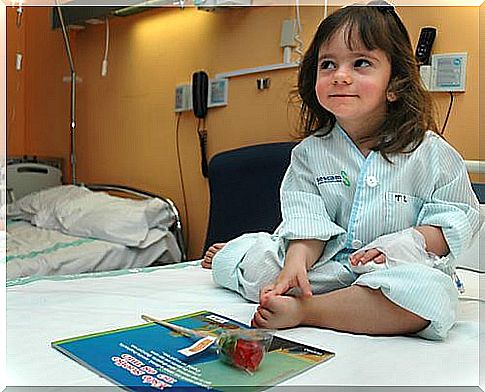Keys To Overcome A Child Hospitalization

Staying hospitalized is one of the most difficult situations to go through for anyone and even more so for children, since it breaks the routine of life. That is why all child hospitalization implies a demand for excessive care and affection for the sick child.
Spending a long time in the hospital, that place that they do not like, without understanding the reasons why they cannot be at home playing, running and jumping like any child is one of the factors why they feel so bored but, above all, a fatal anxiety.
Although each child mentally processes his admission to the hospital in a different way according to his age, character, stage of development in which he is, days of child hospitalization, the disease and the symptoms he presents, children inevitably suffer from this circumstance.
Although the medical personnel do their best to keep minors at ease, the creatures cannot understand so much invasion and aggression against them while missing their homes and habits, even trying to adapt and coexist with those peers going through equally adverse but dissimilar circumstances. .

Conditions of a child hospitalization
One of the aspects that weighs the most when talking about a child hospitalization is the anxiety that suffocates children, who are forced to live without more uncomfortable moments while they are also exposed to really harsh and excessive situations, so difficult to overcome .
These anonymous heroes fight every day with moms and dads to get ahead. And in this daily battle that they wage against their illnesses, the game and the psychological establishment play a fundamental role in allowing them to escape from that world, to abstract from the reality through which such complex pathologies and instants go through.
Between controls, scalpels, punctures and saturometers, these boys live, nothing more and nothing less, than always defying life with a smile on their backs that not even fate, through different paths, could steal from them.
Child anxiety regarding child hospitalization
Psychology differentiates the fear, anxiety, and anguish arising from child hospitalization. Fear is understood as the emotion that arises in the face of a danger of concrete external origin; anxiety, as a subjective experience in the face of a danger of internal and not concrete origin; and anxiety as somatic manifestations of this experience.
However, these three terms are related and combined in practice. In these circumstances, anxiety then appears as an emotional state in which feelings of threatening danger are perceived, characterized by discomfort, tension or apprehension.
In these cases, the anxiety experienced by a child will depend on the evolutionary development of that child, the situation in that state and the defense mechanisms available to deal with such events. Of course, one must also consider family characteristics and the social environment that surrounds him.
Effects of hospitalization on the minor
Whether it is a disease or a child hospitalization, for whatever pathology, a series of effects inevitably originate in the boy, which can be summarized as follows:
- Direct effects. Within this group there are generalized aches and pains, restlessness, irritability, appetite and sleep disturbances, fatigue, etc.
- Reactive effects. These consequences include emotional and behavioral regression, depression, misinterpretations of reality, fantasies about changes in body image, alterations in the child’s social adaptation, school problems, etc.
However, it must be considered that the appearance of these childhood reactions is due to the fact that the disease and the necessary medical procedures involve important changes for him, such as:
- The separation from the family environment and his relocation in an unknown and strange environment for him.
- The possible loss of previously acquired skills.
- The fear of dying, or being hurt or mistreated.
How to overcome a child hospitalization?

It is essential that the hospitalized child receives all the necessary support to recover soon and be able to return to his “normal” life. Therefore, there is no other key to overcoming child hospitalization than to help him in this situation. Also keep these tips in mind:
- Talk to your child about his condition, clarifying doubts and dispelling fears. Once the doctor has diagnosed an illness or indicated hospitalization, it is advisable for both the pediatrician and the parents to provide the minor with an explanation, including: the importance of hospitalization for children and the procedures necessary to cure themselves, the care and treatment that they will receive. in the hospital, the validity and infinity of maternal love will remain valid during the stay in the hospital and the possibility of making new friends within the hospital. In this way, you prepare the child for this event and minimize its emotional impact while reassuring him of his concerns.
- It is forbidden not to play in the hospital. Even if he is hospitalized, do not stop playing with your child since, through play, children express fears and fears while releasing tensions. It is also good for the child to draw and learn about medical supplies through play activities. You can also take boys’ books and magazines to read together and exercise interpretation of texts in order to distract him. Another very good option is to go to games if the objective is to forget the overwhelming routine that child hospitalization entails.
- Collaborate in the care of your child. It is recommended that mothers participate in the child’s medical care to help them heal. It is essential that the child feel loved, cared for and protected.
That is why it would not be bad if, whenever possible, you change his bandage, take him for a walk down the hospital corridor or invite him to spend some time in the game room of the health center, help him with his rehabilitation exercises and be there when I need you.
- Keep your child from feeling lonely or isolated. It is important to promote the child’s communication with all members of the family since it is one of the keys to his speedy recovery. This can be achieved through visits, letters, telephone calls and the various possibilities offered by ICTs, among others.
Likewise, you can consult the medical staff if the child is in a position to receive some friends during hospital visiting hours, as this way your child will be able to live endearing moments with his companions.
- Fill yourself with patience, strength and tolerance to spare for your child. Never lose sight of the fact that the creature is living in a different situation, which necessarily affects its character and behavior. In these moments, there will be no greater gesture of love than to support the child and show him how you feel about him, even in the worst moments.









